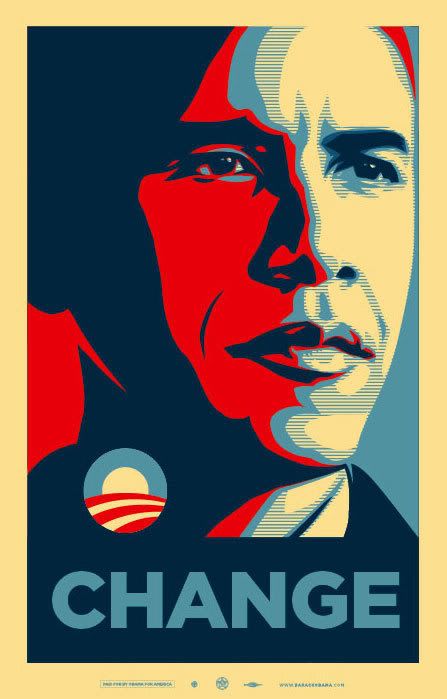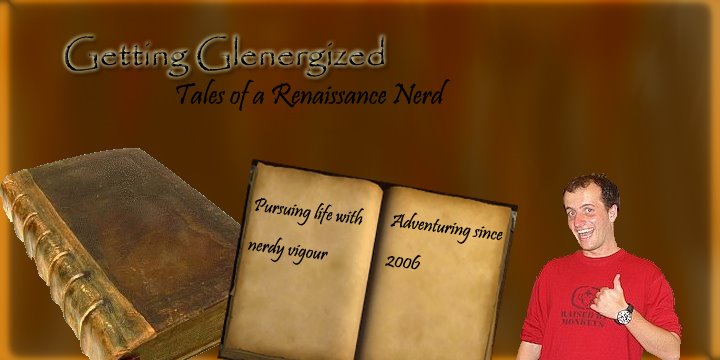 All week, scratch that, all year, I've been ready to write an article outlining my sheer overjoy at an Obama Presidency. Now, since it happened a few short days ago, I have been at a loss. I struggle to find the time or the necessary words to express the sheer magnitude of emotions that I have been feeling since that fateful November night.
All week, scratch that, all year, I've been ready to write an article outlining my sheer overjoy at an Obama Presidency. Now, since it happened a few short days ago, I have been at a loss. I struggle to find the time or the necessary words to express the sheer magnitude of emotions that I have been feeling since that fateful November night.Obviously as a long-time Obama supporter and believer in his inevitable victory (look through my archived posts if you don't believe me), I am ecstatic, hopeful, and vindicated. However, that is not going to be the goal of this post, since that would just be a series of expletives, videos posted and "I told you so's", instead I am going to look at a few major ways that everything changed this week.
No matter what you think of Obama, you have to admit that this is a special, and magical moment, by a pretty special and magical individual. He has long been campaigning on "Change" and even if he does absolutely nothing or is (somehow) a worse President than George W. Bush, he has already brought a great deal of change.
The Race Card: Let's start with the elephant in the room. Barrack Obama is (half) black. Kind of hard not to see that one. Now he has never really played the race card, but the Clintons and McCain/Palin have been subtly playing on racial fears as a method of opposition. Once upon a time (i.e. last week), there were all sorts of talk about America being "ready" for a black President, or concerns that Obama was over polling due to the Bradley Effect.
Yet on November 4th, 2008, all that proved to be for naught. America, once considered to be the most racists of the Industrialized Nations has produced a symbol for hope and unity. Sure, there are still lots of racists in the United States, both whites and minorities, both Southerners and Northerners, but the rest of the world has to start to look at their own racial politics now. All of a sudden people in Canada, Britain, France, Australia, and every other Western Democracy have to stop saying that the United States is so racist, and need to ask themselves if they are ready for a leader with a different skin colour.
The End of Inevitability: While it seems like ancient history already, one cannot overstate the impossible task he faced going up against Hilary Clinton in the primaries. Everyone was so used to saying "President Clinton" once more, and it seemed like a lock that she would win, en route to crushing the Republicans, and the Bush-Clinton-Bush-Clinton circle would be complete. Things, however, did not work out that way. Obama shocked the world with a victory in Iowa, en route to a series of victories in the longest, and most engaging Primary campaign that the United States has ever seen.
Perhaps more shocking, was the thought that only a few years before, the phrase "Permanent Republican Majority" was tossed around frequently. It was thought the Republicans had build up such a solid amount of support in the south by pushing hot button issues like gay marriage and abortion, that they were unbeatable, and would remain so for an indefinite amount of time.
The Re-drawing of the Map: Connected to the above point, is the fact that the US Electoral Map is vastly different than it has been for years. After Nixon created the "Solid South" in 1968, the Democrats were able to consistently win the North East, and the West Coast. However, the electoral count was never enough to push them over.
As a result, it seemed like the only way the the Democrats could win, would be by choosing a leader from the South in order to flip one of the previous Republican states. It should come as no coincidence that the only Democrats to have won an election since Kennedy were from Southern States (Johnson was from Texas, Carter from Georgia, and Clinton from Arkansas) while the Democratic Candidates to not have won an election, McGovern, Dukakis, and Kerry, were from the North. The only exception is Al Gore, being from Tennessee, but I will leave it to you to decide if he won or lost that election.
So now all of a sudden we have Obama being from Hawaii and/or Chicago, who was able to win big in traditional Republican "Bible Belt" states such as Virginia, North Carolina, Iowa, Colorado, and even one Electoral Vote out of Nebraska. This is a huge shift in the way that politics have focused so much on "Swing States" like Ohio, Florida, and Pennsylvania. Obama could have lost those three states that were so key in 2000 and 2004, but still won the election. Something completely unthinkable for a Democrat to have done even a year ago.
The success of this has to be credited to Howard Dean and his 50 State Strategy. He was laughed at for suggesting that the Democrats run ads in typical Republican strongholds, in order for them to spread their wealth and attention, however in the end it worked. This can lead to a radical change in the way that US politics are done, and an electoral map that is far more fluid from term to term than we have seen in a very long time.
Back to the Drawing Board: Again, tied into "The End of Inevitability" is the long road that that the Republican party has in front of it. They were simply embarrassed by the results, and need to make some difficult decisions.
We have already seen the McCain camp come out and blame much of the loss on Sarah Palin, and I assume that we will see Palin's people do much of the same in the coming weeks. This presents a very crucial decision for the Republicans to make. Do they go with a more moderate, ideological based side represented by McCain, and championed by other members like Jindal and Romney? Or do they go with the religious right, represented by Palin, and includes Huckabee? Or do they go back to the drawing board?
This is hardly the big tent party that Regan built, or the champions of the "Common Sense Revolution" lead by Newt Gingrich and friends. They need to find their way, fast, or they could be in a lot of trouble.
While I am a huge bleeding heart liberal, I know that the US needs the Republicans to be a strong party once more. Democracy works best when you have more than one viable option, so that they can push one another to offer more to the voters.
Bottom Up: Due to all of the hype that Obama has been getting in the past few months, it is easy to miss the fact that this campaign was a grassroots movement. Whether it was out of choice, or out of sheer necessity, going up against the Clinton machine, it worked. With the last several Presidents being Washington insiders, with a great deal of support from the party machines, it is interesting to see a campaign done by the people, for the people work.
Obama raised more money than any other political candidate in history, and he did so mostly because of his contact with ordinary people. He had a plethora of small donors give a little, so he could always lean on them more later. This is a stark contrast to the small amounts of maxed out big donors that had been relied upon in the past.
Digital Democracy: There are people who voted in this election who could conceivably not remember a time when the internet was not a part of their lives. While it has been used as a campaign tool before, this marks the first time it was such a central part of a successful campaign.
This reason is two fold. For starters, all of the politicians to have served since 1996 (ish) have been older, and in general, the internet is the domain of younger people. The other, more important reason, is that this is the first Web 2.0 election. Since 2005, the use of blogs has boomed, YouTube started to broadcast, Google cemented its status as a verb, Digg and Delicious brought stories to you, Wikipedia changed the definition of truth, and Facebook has become a household name. The internet is a very different place than it was during the US election, and the Obama campaign was quick to make use of it. They communicated frequently with their supporters on Facebook, dominated Digg, and make any of his speeches easily accessible on their YouTube Channel.
The internet is clearly here to stay, and politicians can no longer ignore its power in the democratic process.
Enthusiasm: Regular followers of this blog will know that I am currently teaching in China, and due to the time difference, the election results were coming in at the same time that the school day started. What I saw over the course of the day simply amazed me.
Throughout the morning, I had students come up to me as we would share our latest electoral counts, and when I walked through the halls all that I could hear was "Obama" in between heated discussions in Chinese or Korean. When the final call was made, just before lunch break, the energy in the school was simply breathtaking. I had students run up to me and give me a high five, and all sorts of them simply overjoyed with the results.
This is the change that has the most potential to make a lasting difference. Think about this, there were teenagers, notoriously the most apathetic of demographics, on the other side of the planet, living in a communist country no less, who became emotionally involved in the political process on the other side of the planet. From what I have read, this was not an isolated incident.
The enthusiasm that was generated as a result of this candidacy is something that hasn't been witnessed in my life time, and probably has not been witnessed since the 1960 US election. This has the real potential to inspire a generation of youthful activists the same way that Kennedy was able to do two generations ago. Once more, with the increase in communication and shrinking of the world, it has potential to be far more far reaching. If people in China were happy about how a democratic election turned out, who is to say that they can't look for one of their own some day soon?
While it is easy to get caught up in the excitement of Obama's victory, and expect an immediate end to the problems in Iraq and on Wall Street. We must remember though, those changes will take time to work out. However, in a lot of ways, the world we enter this week is a vastly different one than the world that started just a few short days ago. Change, my friends, is not coming, it is here.
Until next time,
G

No comments:
Post a Comment